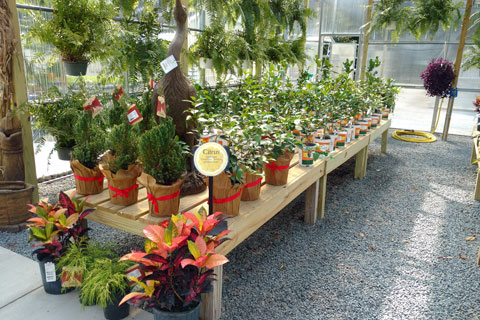11/1/2018
Selling Citrus
Ellen C. Wells
Why should the exterior landscape be the only place gardeners can enjoy their edible bounty? Encourage customers to think edibles inside this winter. Sell them some citrus!
Christine Justice, manager of East Coast Garden Center in Millsboro, Delaware, says their store has had great success selling all sorts of citrus—lemons, limes, grapefruits, limequats and others. One reason is the owners’ passion for propagating and growing most of the citrus plants they sell. That passion shows itself in the quality and variety of citrus they offer, and also in how the indoor citrus products are positioned for sale. “We are also lucky that our customers seem just as excited about citrus as we are.”
“[Citrus] are popular and many of our sales are repeat buyers,” says Kate Terrell of Wallace’s Garden Center in Bettendorf, Iowa. “They start with one tree and then they want to try something else. Many people buy them for the fragrance of the blossoms over the actual fruit.” However, she says, “Two of my avid citrus customers are hipster-dude, Gen Xers who are growing limes, lemons and oranges for their craft beers and artisan cocktails.” That’s a great idea!
Stephen Raven of Hole’s Greenhouses & Gardens in St. Albert, Alberta, says citrus plants have become steady sellers. “People seem to want to grow them for fruit, more than for the plant itself,” he says. Hole’s locates their citrus outside with the herbs and edibles in the spring and summer, and the move them in with the tropicals in winter.
Kate says citrus plants do pose some difficulties at retail. “They are more difficult than other houseplants because they are bigger and take up more space,” Kate explains, adding that other interior plants can turn faster. “They also require more maintenance and vigilance with pests.”
Because citrus can be tricky to grow, Kristen Busse, greengoods supervisor for Greengate Garden Centres in Calgary, Alberta, says they include a customer care card with their citrus plants. The care card is branded with the store logo and contains watering instructions, light, fertilizer and soil requirements. Their other challenge is keeping varieties in stock. “Lemons are our number one seller so when we receive a shipment of citrus, they are the first to go.” Limes, oranges and grapefruit don't sell as quickly, she adds. Kristen notes that they sell a bunch of citrus in May and June (many as patio planters) and then another sales wave comes around Christmas and New Year.
The Shipping Situation
Many growers based in Florida and California are dealing with state regulations pertaining to citrus varieties. As a result, many retailers say supplies are limited, and have even said some growers are shipping citrus within state only to limit their shipping hassles. Find and cultivate local sources of citrus for reliable supplies as your citrus sales pick up.
Tips for Selling Citrus
• Cross Merchandise! Include bagged citrus/palm soils, citrus-specific fertilizers, horticultural oils and moisture meters.
• Pot Options. East Coast Garden Center is sure to include a variety of pot options, which Christine says they change out seasonally.
• Signage. Keep the message brief so as to not overwhelm the customer. Include light, water and special notes.
• Variety. Include the go-to lemons and limes but give your customers something different, too. Try Meyer lemons, limequats, kumquats, variegated pink lemons and other not-so-common varieties.
• Eye on Care. Citrus can attract spider mites and mealy bugs. Watch water and fertilizer, as these can cause leaf drop. GP
 Pictured: East Coast Garden Center cross-merchandizes their citrus with bagged soils and fertilizers, but locate them across the aisle to keep them dry. Check out their clean and simple signage.
Pictured: East Coast Garden Center cross-merchandizes their citrus with bagged soils and fertilizers, but locate them across the aisle to keep them dry. Check out their clean and simple signage.